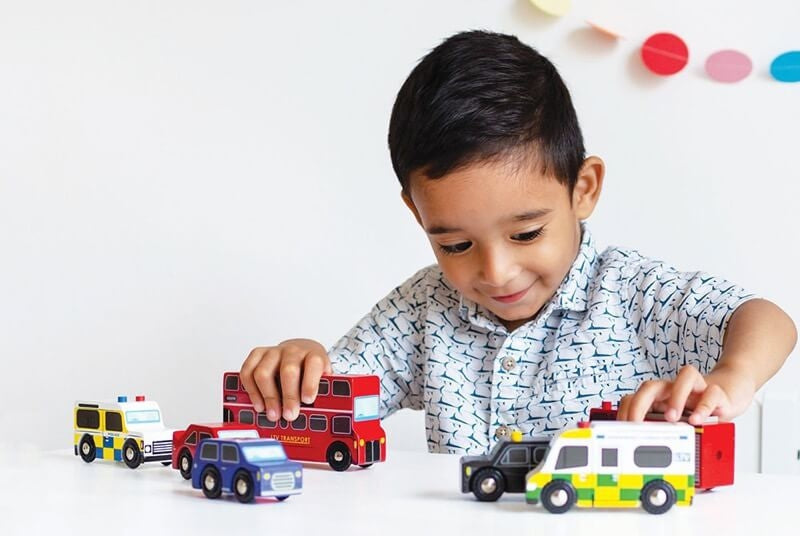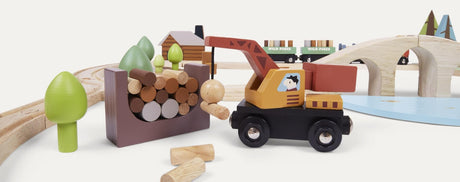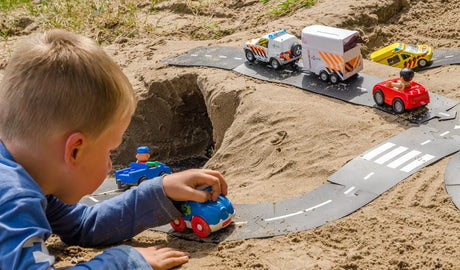We all want to raise children who are fulfilled, resilient, creative and ready to learn. But what if one of the most important things we can do for them is to provide them with the time and space for “open play”?
OK, but then? We let the children be free, have fun and that's it? Isn't that a little too simple? We all understand this hesitation.
However, open play time is essential to the child's development, both motorically and intellectually. But why is it so important?
What is open play?
“Open play”, as the name suggests, lets children decide independently how they want to play. It’s child-led, imaginative play.
And on the hardware side, one key word: simplicity! We favor simple tools that can be used in different and creative ways.
Unlike more structured and directed activities, in open play, the important thing is not the final result or “ succeeding ” but rather trying and putting creativity into action . Playdough and building blocks are good examples.
Open play: 6 good reasons to adopt it
Our society runs at a thousand miles an hour! And as parents, we tend to overschedule and supervise all of our children's activities for fear that they will be bored or "miss out" on something.
But, we forget an essential element: our little ones are born with an innate curiosity , a deep desire to learn and, GREAT capacities for imagination .
Left to their own devices with a few simple materials, children can amaze us and quickly make great leaps in development.
Let's see together, in 6 points, why open play is so important for our children.
1. Stimulation of independence and autonomy
Children have the soul of real scientists! They love to multiply experiences of all kinds. They indeed have this natural ability to observe and explore. Testing ideas on their own is one of their favorite pastimes!
Open play gives them precisely the terrain necessary for free and autonomous exploration .
The little extra? By encouraging this type of activity, our children will be less dependent on us and will learn to make choices for themselves.
Too many organized activities may limit a child's ability to motivate and self-direct – Kim John Payne
2. Development of one’s ability to solve a problem
Open play is one of the best allies for learning : it provides a low-stress environment where children can take risks and make lots of discoveries.
The fear of making mistakes is one of the biggest obstacles to learning during childhood (a fear that often continues to haunt us into adulthood too, right?).
Through open play, children can explore their environment without fear of failure . He thus learns to find solutions for himself to the problems he encounters. He also discovers that everyone has the right to make mistakes. And it’s even by making mistakes that we learn!
3. Promote self-confidence
Your child explores, experiments, and discovers, thanks to all his experiences, using his 5 senses: sight, touch, hearing, smell and taste.
By allowing independent exploration without fear of error or judgment, open play encourages your child to make choices for themselves, to make decisions, and to find the necessary solutions.
In short, it helps them assert themselves, gain confidence and develop their self-confidence .
4. Development of creativity and imagination
In open play, the child can use the same object in several different ways, according to his imagination. The absence of rules offers great freedom to the child; he thus develops his imagination and creativity.
A piece of wood can become a sword, a cabin, rails… A piece of fabric can become a superhero cape, a doll blanket, a dress or a tent.
Building sets like Legos and wooden blocks, as well as paint or playdough are also great for open play. They allow almost endless combinations of construction and creations.
And once his masterpiece is accomplished, what pride for your child to be able to shout loud and clear: “You saw, mom/dad, it was me who did it alone!”
5. Helps concentration
Little ones are very curious by nature. Might as well use it! When children have an opportunity to play and explore freely in a supportive environment, they demonstrate a strong ability to concentrate.
This is why it is important to let your child choose an activity spontaneously. By responding to an impulse that comes from within, he channels all his energies and perseveres in an activity which naturally concentrates all his attention.
6. Managing boredom
During his free time, a child will have the opportunity to experience boredom.
Yes, it certainly seems weird to you, but boredom is an important and educational concept for children!
It allows your child to be more attentive to what he wants and invites him to initiate an activity on his own. To fill the monotony, your child will be able to draw on their resources and use their imagination.
In fact, we can think that when the child does nothing, he gets bored and risks becoming impatient. And yet, the reality is quite different. Yes, let's not forget that open play promotes observation. Even when the child appears to be inactive, he is absorbing information from his environment.
By having the freedom to manage their activity, your child takes the time to focus more on the little details.
How can we encourage open play?
Yes, you understand, it is very important to allow children to play on their own, as much as possible.
But what is our role then? How can we help them?
Well, it's very simple, all you need to do is provide a supportive environment that encourages children to engage in this type of exploration.
4 essential things to anticipate to encourage open play:
1. Make equipment available
Simple materials offer a multitude of possibilities for creative and curious children.
Lack of ideas on the type of tools to use? Patience, I'll give you some ideas a little later in the article.
2. Schedule free time:
Yes, free time is essential to allow your child to use materials and toys as they wish and at their own pace.
To make your child want to start an activity, avoid overloading their days with activity and give them time to “get bored”.
Rest assured: if the child has a minimum amount of equipment at his disposal, he will not sit idly by doing nothing for long!
3. Reduce Screen Time:
Eliminate screens in favor of play time and encourage this type of open play experience.
4. Avoid intervening in all their activities:
Give your child the time and space to think about possibilities and take action, without your help.
What type of materials and toys to encourage open play?
Here are some examples of materials:
Modeling clay: A great classic! Children love creating and playing with play dough !
Building Blocks: There are a million ways to play with blocks , making them the perfect foundation for free, child-led play.
Recycled materials: Boxes, cardboard tubes, empty bottles... Your child can build things, break them, fit them together, put things in them, create characters, trains, animals...
Sand: Ahhhh, the sandbox! There are so many possibilities for games and creativity. For indoor play, kinetic sand is a good alternative.
Small Vehicles and Figures : Children can create their own incredible worlds with these types of toys.
Water: Most children LOVE exploring with water and it's a simple way to encourage open play.
Creative materials : Paper, glue, pens, pencils, paint, feathers, glitter (argh!). These are things that allow for precious moments of play.
Musical Instruments: With musical instruments , children can explore different sounds and varied rhythms. It's a fantastic way to encourage sensory discoveries, creativity, coordination and motor skills!
What we can remember:
In our society, we tend to overload our children's schedules: school, extra-curricular activities, cultural outings, activities at home... As parents, we are sometimes afraid that our children will are bored or “miss” something.
But they actually need time to get bored! Because it is the best way for them to learn to take initiatives and decisions.
Open play promotes:
- experimentation
- imagination
- creativity
- independence
- autonomy
- problem solving.
Our little ones are born with an innate curiosity, a deep desire to learn and GREAT imaginative skills.
So, let's trust their natural abilities and let our children play freely!





